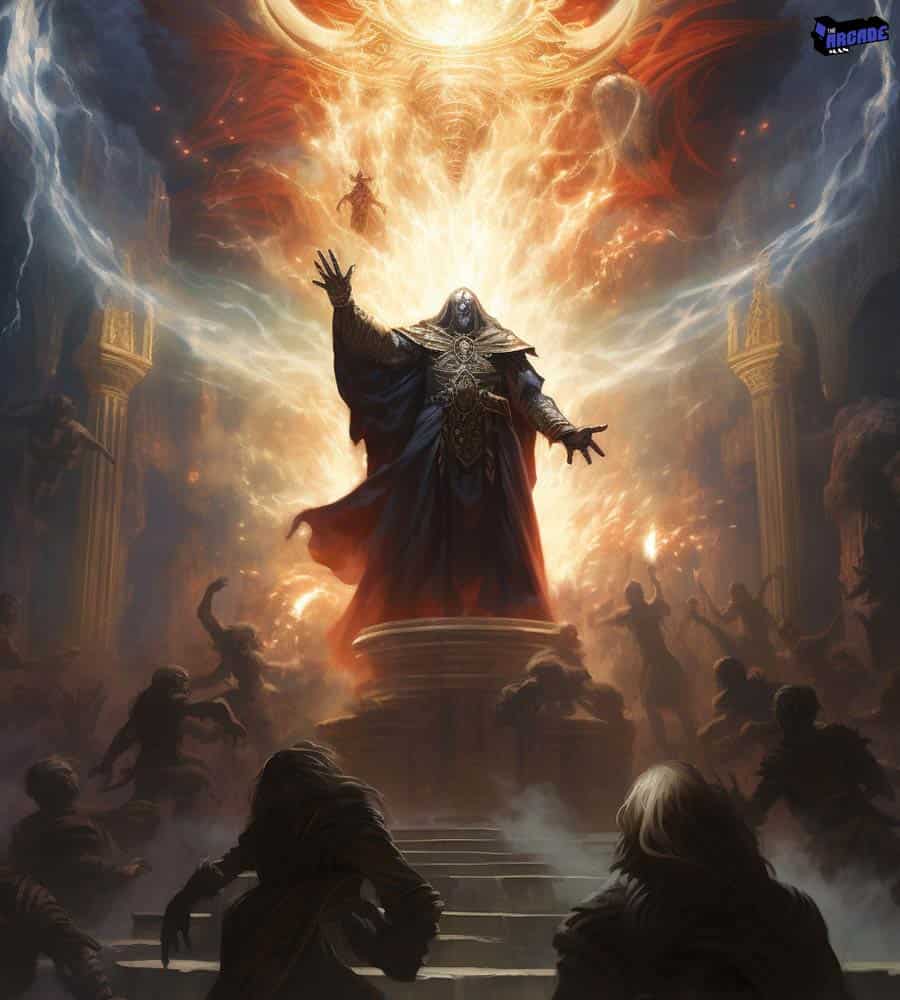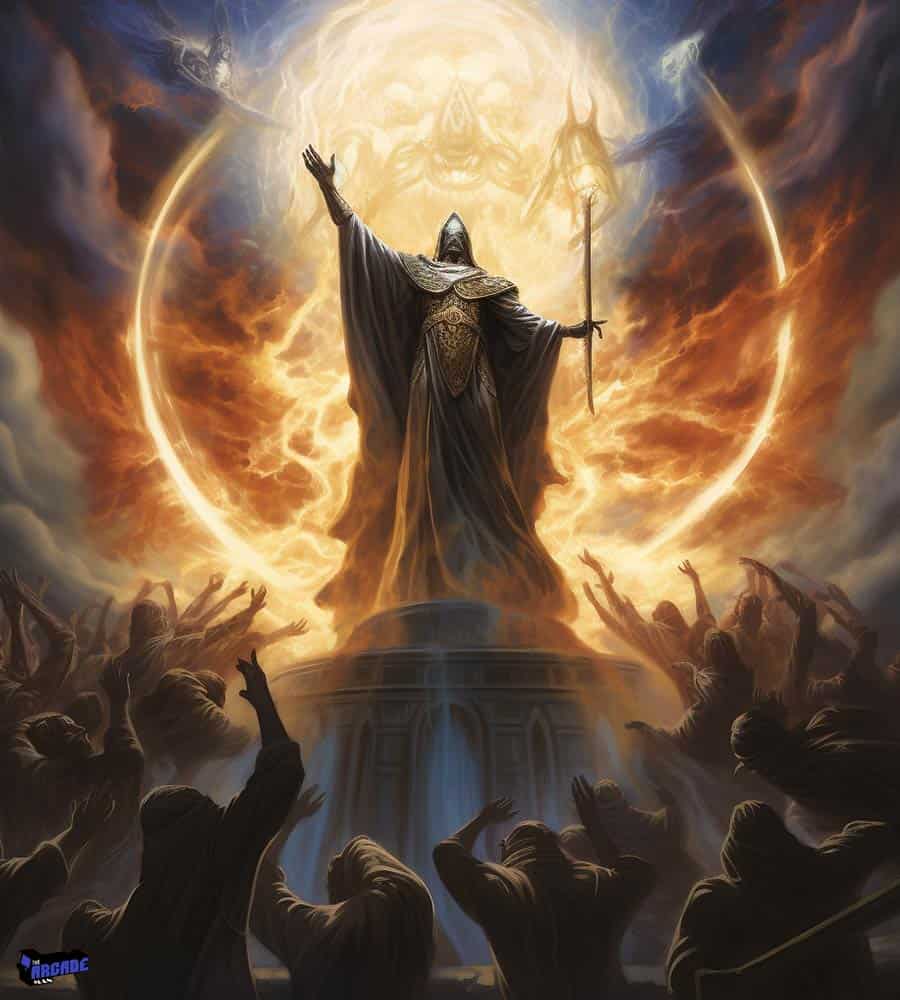A Guide To Becoming A God In D&D 5e

Ever dreamed of ascending to godhood and attaining divine power in your Dungeons & Dragons campaign? This blog guide will walk you through the monumental steps needed to become a deity in DnD 5e. From gathering loyal worshippers, acquiring mighty artifacts, and performing legendary feats, we’ll cover tips and strategies to increase your power and establish your divine domain.
Learn how to defeat rival pantheons, amass boons from existing gods, and navigate the complex politics of deity status. With enough preparation and epic adventures, you can ascend through the ranks from demigod to lesser god to greater god. Follow along on the legendary journey to true divinity and unlock your character’s heavenly potential in this comprehensive guide to becoming a god in DnD 5e!
Is It Possible For Anyone To Become A God In D&D 5e?

It is difficult for a player character to become a god in Dungeons and Dragons 5th Edition through conventional gaming. This is because gods in D&D are seen as extremely powerful entities with their own realms and followers, and are often outside the reach of conventional character growth.
Nonetheless, a player character can interact with the gods and even become a demigod in certain ways. Completing epic adventures or meeting certain prerequisites, such as becoming the chosen champion of a particular deity or obtaining access to powerful divine items, are common examples.
The ability of a player character to acquire godhood in D&D 5e is ultimately up to the game master’s decision.
How To Make A God In D&D 5e?
1. Decide Your God Character Persona
The first step in creating a deity character in D&D 5e is deciding on a persona for your god. Their alignment, domains, portfolio, and personality qualities are all part of this. The ethical and moral compass of your god, such as whether they are lawful or chaotic, good or evil, or neutral, is referred to as alignment.
Domains are regions of influence held by your god, such as war, death, or wisdom. A portfolio refers to the specific aspects of life or nature over which your deity rules, such as love, storms, or healing.
Personality qualities allude to your god’s distinct attributes and peculiarities, such as being stoic, wrathful, or wise. After you’ve established your god’s persona, you can go to the next step, which is establishing their skills.
2. Get A Divine Spell
Obtaining a divine spell is the second step in creating a god in D&D 5e. As a deity, your character must be able to bestow divine spells on their followers. To do so, select a domain or portfolio that depicts your god, such as battle, death, or nature.
Each domain is associated with a set of spells, and your god should have access to all of them. You can even make your own spells to match your deity’s particular talents and powers.
Once you’ve decided on your domain and spells, you may start thinking about how your deity will interact with the game world, such as their spheres of influence, preferred weapons, and so on.
3. Gather Followers For Your God Character
The following step is to gain followers. As a god, you require a following of humans who believe in and worship you. These followers can range from ordinary people to powerful individuals such as clerics, paladins, and other divine spellcasters.
You must first establish your presence and make your heavenly powers known to the world in order to gain followers. This might be accomplished by creating a religion, constructing temples, and helping people. You can also interact with your followers through visions or transmit messages using divine spells.
Once you’ve attracted followers, you must give them a feeling of purpose and direction. This can be accomplished by establishing a set of beliefs, rituals, or behaviors that your followers must follow.
Your power and influence in the world of D&D 5e will expand as your following grows. You may even attract the attention of other gods or strong entities, resulting in war or alliances. In D&D 5e, your ultimate objective as a god is to amass enough power and influence to become a prominent role in global events.
4. Perform Rituals To Become A God
This step consists of developing and carrying out rituals that will aid your character’s ascension to godhood. First, learn about the D&D world’s lore and history in order to grasp the rites and conditions for ascension. Then, come up with your own unique rituals that correspond to your god character’s demeanor and ambitions.
Gathering strong items, performing sacrifices, and conducting elaborate ceremonies should all be part of the rituals. You may need to enlist the assistance of other powerful NPCs or even other players to complete the ritual.
The ritual’s success will be determined by the DM’s judgment as well as the character’s previous actions and accomplishments. It’s vital to highlight that becoming a deity should not be easy, and it should necessitate a major time and effort investment.
Once the ritual is completed, the DM may bestow godlike powers and abilities on the character, such as the capacity to bestow spells and powers on followers, influence natural events, and even construct entire worlds.
5. Cast Godhood Spells For Ascending To Godhood
Casting godhood spells for climbing to godhood is the next step in becoming a god in D&D 5e. These spells are one-of-a-kind and extremely strong, and they are usually only available to the game’s most powerful characters.
The “Ascension” spell, which is used to ascend to godhood, is one of the most essential godhood spells. This spell necessitates a significant amount of power and preparation, and it can only be cast by a character of a particular degree of experience and expertise.
“Divine Intervention,” which allows a deity to intervene in the mortal realm, and “Create Avatar,” which allows a god to construct an avatar that can act on their behalf in the mortal world, are two more key godhood spells.
In D&D, there are two typical spells associated with players ascending to divinity.
These are the two spells:
• Wish
• Karsus’s avatar
The spell, in essence, borrows divine power from another god. The disadvantage is that the spell is just momentary. Your players could still utilize it to become a god for a short time before granting a more permanent divine spark or killing another lesser deity.
6. Obtain A Legendary Item
In DnD, the Infinity Spindle has the power to transform any being into a god. Yet, it is difficult to locate because its protector, Raxivolt, conceals himself and the spindle. Your Dungeon Master (DM) can even create new legendary or magical items from scratch.
The item could be a weapon, a piece of jewelry, a symbol, or an artifact representing the abilities of your god. The legendary item should also be related to your god character’s backstory and mythology. It should be something strongly related to your god’s origins and powers.
The hunt for a legendary item should be difficult, comprising epic quests, fights, and tests of power and skill. Legendary objects in D&D 5e contain tremendous abilities that can assist your deity character in achieving their aims and influencing the world.
These artifacts are also associated with narrative and history, which contributes to the depth and richness of your deity character’s backstory.
Can A Wish Spell Help You In Becoming A God?

In D&D 5e, the Wish spell is a powerful and versatile spell that can give a variety of effects such as monetary wealth, healing, and even the resurrection of the dead. But, becoming a deity is a feat that even the most powerful spells in the game cannot accomplish.
According to the D&D 5e rules, only divine creatures may grant mortals godhood, and this procedure demands a great amount of work and commitment on the part of the mortal. In other words, while a Wish spell may assist you in some small way towards becoming a god, it cannot directly grant you godhood.
In D&D 5e, the only method to do so is to complete the processes stated in the game’s lore, which include gaining followers, executing rituals, and earning a legendary item.
Conclusion
In d&d ascending to godhood is a complex and challenging process that requires a great deal of effort, dedication, and creativity. From choosing your god character persona to earning a legendary item, each step is critical and requires careful strategy and execution.
Whether you choose to gain followers or execute rituals, the path to godhood is not easy, but it is undoubtedly rewarding. You can become a deity in D&D 5e and enjoy all the rewards that come with it with the perfect combination of strategy and luck.
So, if you’re prepared to put in the effort and are up for the task, start your road to godhood in D&D 5e!






